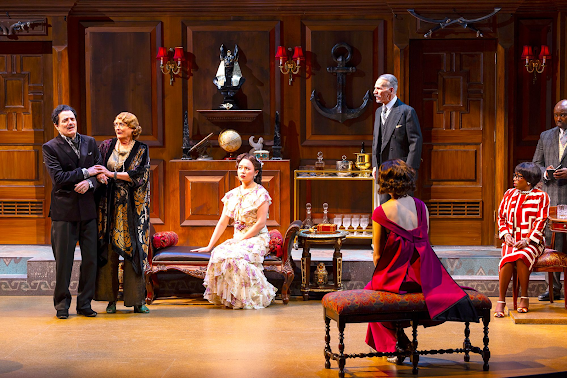Death on the Nile, Kreeger Theatre, Arena Stage, Washington, DC
Armando Durán as Hercule Poirot in Agatha Christie's Death on the Nile. Photo credit: T. Charles Erickson Photography.
When a new adaptation (by Ken Ludwig) of Agatha Christie’s Death
on the Nile was announced as the first production to be directed by Hana S.
Sharif, who succeeded Molly Smith as Arena Stage’s artistic director, I was
surprised. Based on her artistic director bio, and having heard her speak at
various openings this past year, I expected something more cutting-edge, more
socially conscious, reflecting her penchant for new works and plays concerning
underrepresented groups. Yes, this is technically a new work, but a plot-heavy
mystery about a group of well-to-do characters set in 1937 was an unexpected
choice. But in Sharif’s bio as the play’s director, the first credit mentioned
is another Agatha Christie chestnut, Murder on the Orient Express. Perhaps
the choice is not as unexpected as it seemed.
Plays and films based on Agatha Christie’s mysteries have
been popular with audiences over the years as well as the novels on which they
are based. There is a formula that we know well: one or more of the characters
will be killed, many (if not most) of the characters will appear to have had a
motive, and an intrepid detective (who just happens to be present) will put all
of the clues together to determine “whodunit,” as well as how and why, if we
don’t already know. There is a familiarity to the structure that can also be
found in various procedurals – witness the popularity of television crime
dramas and true crime programs.
The play begins with a scene on a London street between two
lovers, Jacqueline (“Jackie”) de Bellefort and her fiancé Simon Doyle, who are
observed by Belgian detective Hercule Poirot. Jackie is anxious to introduce
Simon to her best friend, heiress Linnet Ridgeway, at a British Museum gala
marking the decision to return an ancient Egyptian sarcophagus to the country
from which it was taken. Eccentric Egyptologist (is that redundant?) Atticus
Praed presides over the ceremony. Also attending are his son Ramses, who became
a doctor instead of following in his father’s footsteps; attorney Annabelle
Pennington; actor Septimus Troy; socialite Salomé Otterbourne and her daughter
Rosalie; the aforementioned Poirot; and Poirot’s friend, Colonel Race.
Eric Hissom (Septimus Troy), Nancy Robinette (Salomé Otterbourne), Sumié Yotsukura (Rosalie Otterbourne), Katie Kleiger (Jacqueline de Bellefort), Armando Durán (Hercule Poirot), Felicia Curry (Annabelle Pennington), and Jamil A.C. Mangan (Colonel Race) in Agatha Christie’s Death on the Nile. Photo credit: T. Charles Erickson Photography.
After the London festivities, the characters all embark on
what is supposed to be a leisurely trip up the Nile to return the ancient
sarcophagus. Romantic entanglements among the characters begin or change,
resulting in a schism between former best friends Jackie and Linnet.
No plot spoilers here! Suffice it to say that there is,
indeed, a death as they cruise the Nile. All who are still alive (except Poirot
and Colonel Race) are suspects but of course deny their guilt, leaving it to
Poirot to unspool what has happened.
Ken Ludwig’s adaptation is straightforward and succinct. He
has considerably trimmed the number of characters from the novel to a very
manageable 11. What Ludwig adds to the mix is a fair amount of humor that is
not typically a part of Christie’s original. The humor derives principally from
the individuality of the characters, sometimes lampooning their idiosyncrasies.
Sharif elicits strong performances from her cast. A good
Agatha Christie requires a suave and sophisticated Poirot, and Armando Durán
delivers both, along with a wry sense of humor. (One of my favorite moments: as
Colonel Pace rounds up the suspects for Poirot’s reveal, he leaves the stage so
that he can comb his moustache before his big moment.) Among the others, I was
most delighted by Nancy Robinette as Salomé Otterbourne, who has fancied
herself as a writer and now considers herself an actress. Robinette is
delightfully kookie and appears to be enjoying herself immensely. Eric Hissom
is properly egocentric as actor Septimus Troy. Robert Stanton makes
Egyptologist and magician-in-training Atticus Praed endearingly funny. Jamil A.
C. Mangan is suitably logical and bombastic as Colonel Race. Felicia Curry
makes the most of Annabelle, her too-brief but pivotal role. Olivia Cygan and
Katie Kleiger are well-matched rivals Linnet and Jackie, and Travis Van Winkle
is an appropriately studly Simon. Ryan Michael Neely as Ramses Praed and Sumié
Yotsukura as Rosalie Otterbourne serve largely to play off the parents of their
characters, creating a fine “secondary” couple.
Death on the Nile receives a sumptuous physical
production. Alexander Dodge’s scenic design creates a variety of locales,
abetted by some clever turntable use. Costumes designed by Karen Perry are
spot-on for period and character, stylish and playful. Lighting designer
Kenneth Posner and projection designer Brittany Bland, along with sound
designers and music composers Charles Coes and Nathan A. Roberts help create
the look and feel of being on the Nile, giving the piece a cinematic dimension.
Hair and wig designer LaShawn Melton and fight director Rick Sordelet
contribute their wizardry to the proceedings.
You can glide up the Nile in the Kreeger Theatre at Arena
Stage through December 29. And perhaps the next mystery to solve is what Sharif
will direct next.
Eric Hissom (Septimus Troy), Nancy Robinette (Salomé Otterbourne), and Sumié Yotsukura (Rosalie Otterbourne) in Agatha Christie’s Death on the Nile. Photo credit: T. Charles Erickson Photography.






Comments
Post a Comment